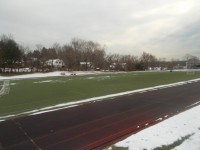P’ville Board of Ed Awards Three Bids; No Decision on Turf

Pleasantville School District officials have awarded three of four capital projects bids, while a final decision on artificial turf remains unresolved.
John D’Angelo, the district’s architect, said seven bids were received that matched the specifications for new artificial turf fields at all three schools. The bids included various types of infill for the playing surfaces at Pleasantville High School and Pleasantville Middle School, including EPDM rubber, organic infill and polymer-coated sand in addition to the standard crumb rubber.
A group of district parents have been adamantly opposed to the latter option, citing health concerns because the material may contain carbon black and other carcinogens.
Board of Education President Shane McGaffey said the EPDM infill and the polymer-coated sand are cost prohibitive, priced at about $250,000 and $400,000 more than the crumb rubber, respectively.
The lowest bid came from King’s Capital Construction in Dobbs Ferry, which submitted a base bid of $1,403,200 for crumb rubber infill. It could also use an organic infill, which consists of 90 percent coconut and 10 percent cork, for an additional $105,000.
District officials explained that even though the organic infill is priced slightly higher, they are able to consider it as an option because bids for other projects came in lower than expected. In addition, the second phase of the capital improvements project, which is currently awaiting state Education Department (SED) approval and includes $1 million worth of technology and safety improvements, can be funded from the Smart Schools Bond Act for technology upgrades instead of using money from the $3.5 million bond approved by district voters last May.
“The long and the short of it is, though, the way the numbers came in, when it comes to the fields, economically we have two very viable choices,” McGaffey said.
Although crumb rubber remains on the table for now, some residents are steadfastly against using the substance because they believe the product is linked to an increased cancer risk. There is currently no definitive scientific link between crumb rubber and cancer.
“I feel it’s a choice between something we believe is toxic, [which] has a lot of pointers it is toxic, and something that may be possible for a bit more money, and I very strongly recommend the board considers the health of our children,” said resident Helen Meurer. “I don’t feel there’s a need to install something that the public is finding to be inappropriate for children to play on.”
Matthew Finkelstein, a founding member of Parents Advocating Clean TurfGrass (PACT), submitted a petition to the board of education asking that it choose the safest nontoxic option that is independently certified and doesn’t include carbon black, carcinogens, BPA or other chemicals.
D’Angelo said he’s not sure that any product will meet every requirement in the petition, but explained that a material data sheet will give a detailed summary of the chemicals and materials that will be in the product that is selected. This information will not be obtained until the bid is awarded, however.
Finkelstein and other residents were also concerned about the materials to be used in the drainage pad that will be underneath each field, especially at Bedford Road School (BRS), which will use only a shock absorbing pad without any infill. They asked that the board utilize polypropylene, which they believe to be the most benign substance for the project, as opposed to polystyrene, which is essentially Styrofoam and contains a variety of chemicals.
District officials said they can request that the eventual contractor use one product over another, but can’t require it because it was not included in the original bid specifications.
The board will vote to award the bid for the athletic field’s project and decide which infill will be used at its meeting tonight (Tuesday).
Last week they awarded the bids for the three remaining aspects of the Phase 1 projects. The bid for site construction, which consists of paving and sidewalk repairs at BRS, was awarded to Avanti Building Construction Corp. of Mount Vernon for $123,800. The general construction bid, which includes changes to the BRS vestibule doors and removal and replacement of the asbestos ceilings at the middle school, was awarded to Peter A. Camilli & Sons of Pleasantville for $280,000. The middle school roof replacement bid of $867,500 went to Sea Breeze General Construction, Inc. of Astoria, Queens.
The board also added a concrete pad near the dumpsters at BRS for $11,000 and partial replacement of the middle school roof for $13,500. That section was not included in the original bid because it is only 10 years old, but Director of Facilities Steve Chamberlain explained that replacing it now would be easier than attempting to repair the roof’s hard-to-reach portions in the future.
“I would hate to redo the roof, and five or six years from now that small area starts to leak, then you have to stage something up on a roof that you’ve just redone,” he said.

Examiner Media – Keeping you informed with professionally-reported local news, features, and sports coverage.
